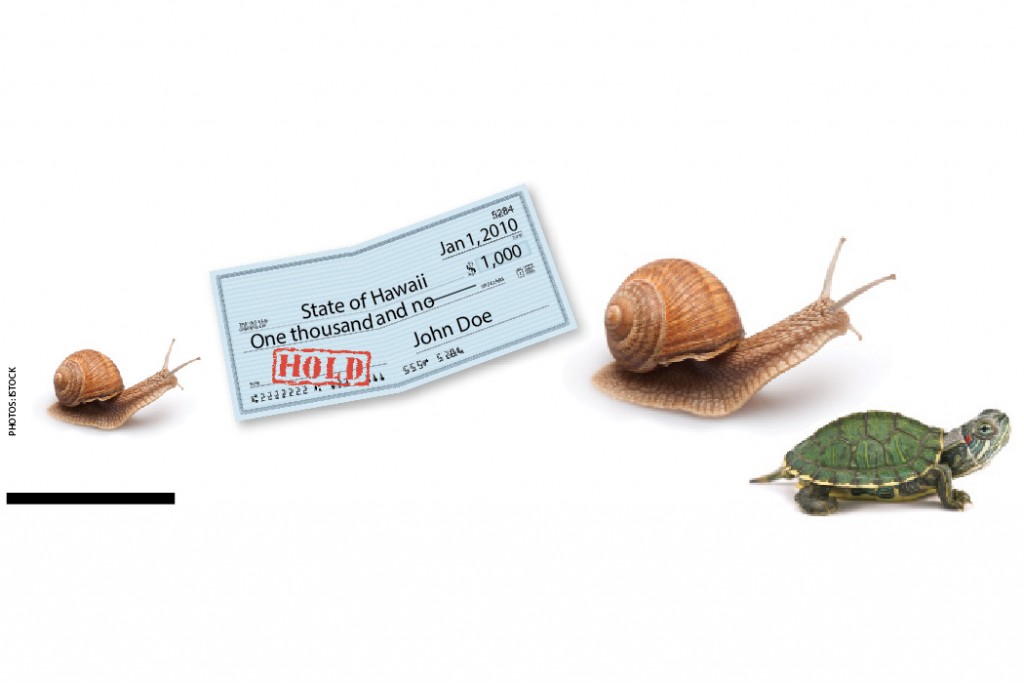Hurry up and Wait on Taxes

Businesses must pay GET earlier, but state takes longer to cash checks
For decades, the state has taken weeks on average – even months – to cash taxpayers’ checks. Now, with government-worker furloughs and restrictions on temporary hires, the check-cashing delay has gotten worse.
What makes many business owners especially angry about the delays is a new law, which took effect this year. The law forced them to rush to pay their monthly excise tax payments by the 20th of the following month, instead of the end of the month. The point of the law was to reduce the state’s cash-flow crisis.
From July through September, the first quarter of the state’s fiscal year, the state took an average of more than two weeks to cash checks, says taxation services administrator Joan Bolte, who oversees the check processing. She says that’s about double the average time it took last year.
But many people who write tax checks say it takes much longer on average than that to deposit their checks. Kaneohe CPA Ted Talbot says it takes four to six weeks for his general excise tax payments to clear; other businesspeople cite similar month-or-more delays.
Lowell Kalapa, head of the Tax Foundation of Hawaii, says he put a check into a drop-box at the Tax Department’s Punchbowl Street offices on July 20.
It finally showed up at his bank a month later. That’s opposed to a property tax payment he made to the City and County of Honolulu that was cashed in two days.
Processing can be complicated by people filing late returns, writing checks for incorrect amounts, not including checks, or mailing returns and checks separately.
For comparison purposes, Hawaii Business looked for a big local company that processes a lot of checks; Servco Pacific says that its automotive division deposits checks it receives on the next business day.
Kalapa says that a state government short on cash needs to speed up its process. “Someone should be sitting over there and saying, ‘How can we get this money into the bank faster.’ ”
Tax administrator Bolte cites several factors for the slowdown in check cashing:
• A backlog builds up on the twice-a-month furlough days for state workers. “The biggest issue for us is the furloughs,” says Bolte. “The work doesn’t go away.”
• A reduction in 89-day temporary employees who helped during busy periods; and
• A crackdown on people who don’t file GET returns, which resulted in more filings.
Bolte oversees workers who open tax returns, make sure checks are attached, scan tax forms and then post checks.
The system sounds simple, Bolte says, but processing can be complicated by people filing late returns, writing checks for incorrect amounts, not including checks, or mailing returns and checks separately. Processing slows around the end of January and July when semiannual filers join monthly and quarterly filers in submitting GET payments.
CPA Talbot says furloughing these workers is a huge mistake. “Furloughing the Tax Department is kind of like a farmer eating his seed corn,” says Talbot, who wonders how much interest the state is losing because deposits are delayed.
GET accounts for roughly half of all taxes collected by the state. The Tax Department processes payments for 230 types of taxes and receives about a ton of mail in the week following the April 20 deadline for filing Hawaii income tax returns. In any given year, the department processes 3.3 million documents and payments.
Kalapa says slow checking cashing has been the norm for decades, aside from a period during former Gov. John Waihee’s administration. “Since then it’s gone back downhill,” he says. “This has been going on for ages.”
The processing times are especially galling to businesspeople who feel rushed by the earlier deadline for filing GET. Last year, state legislators voted to advance the cutoff for filing GET payments from the last day of the following month to the 20th.
By advancing the deadline, end-of-fiscal-year payments that would have arrived at the Tax Department in the new fiscal year were moved into the current one. It gave the state an estimated one-time gain of $75 million to $100 million and helped legislators balance the budget.
“They’re making businesses bend over backwards to get it by the 20th, says Tim Lyons, head of the Hawaii Business League, a group with 1,100 small businesses as members.
“It doesn’t seem to be accomplishing much if the state isn’t cashing its checks on time.”
Bolte says it may not seem like the state has cut check-cashing time, but it has come down from prior years. She said that, before fiscal 2007, it took 75 business days on average to cash payments. That was winnowed to 10 business days in fiscal year 2009, she says.
The faster times are helped in part by a requirement that large businesses – those with $100,000 a year or more in GET payments and $40,000 in withholding taxes – now remit their payments electronically.
With the start of this fiscal year, the average time to deposit checks increased to roughly 11 business days. Bolte says the state can deposit checks within two or three days during nonpeak times, but that the 11-day average could grow as the state enters busy filing periods.
Bolte says the situation would be worse if not for other Tax Department employees, who don’t normally process payments, stepping in to help.
Where the State’s General Fund Gets Its Cash
Tax Revenue Source
Collected fiscal 2009 % of Total
Banks/Financial Corporations
$26.1 million 0.62%
Conveyance
$8.3 milion 0.20%
General Excise & Use
$2.42 billion 57.5%
Income tax, Corporations
$53.5 million 1.3%
Income tax, Individuals
$1.34 billion 31.9%
Inheritance and Estate
$270,000 0.01%
Insurance Premiums
$93.7 million 2.2%
Liquor & Permits
$47.2 million 1.1%
Public Service Companies
$126.1 million 3.0%
Tobacco & Licenses
$77 million 1.8%
Transient Accommodations (hotel room tax)
$13.6 million 0.3%
Other
$500,000 0.01%
Total
$4.2 billion 100%
Source: Hawaii Department of Taxation






